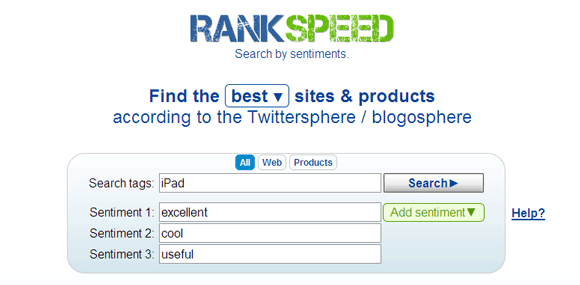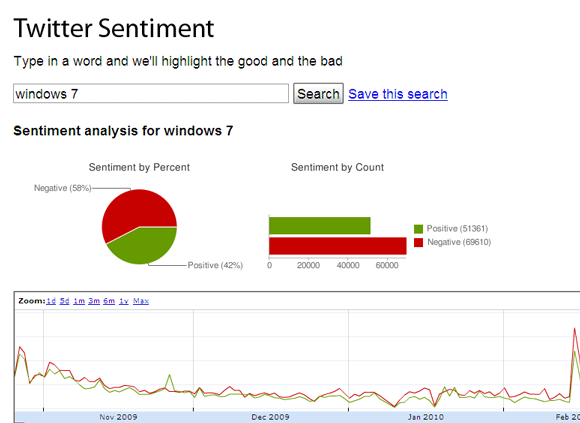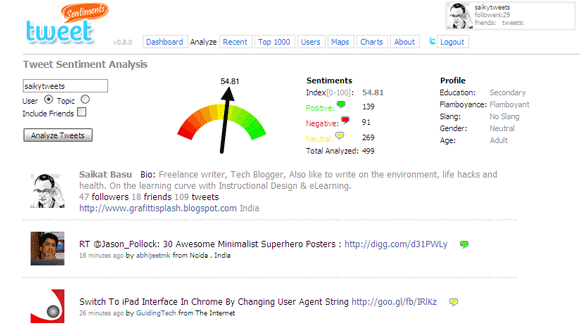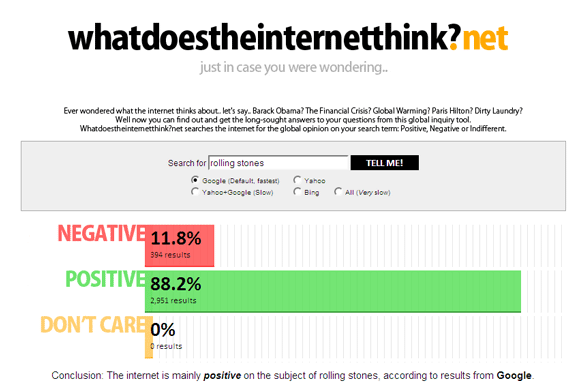Sentiment search is at the cutting edge of web search. Emotions or sentiments get expressed through ideas, opinions, criticisms, and sarcasm. The web is its melting pot. It gets expressed en masse in blogs and forums. Now Twitter has deepened the ocean of sentiment.
Sentiment analysis or opinion mining has long been a part of data analysis. Surveys and polls are the old world tools for measuring the pulse of the crowd. Web 2.0 brought in the flood.
Those little thumbs up or thumbs down icons you see next to a web entry are sentiment capturing tools. Recommendation websites where you get to catch the review of a latest movie or a restaurant are spread right across the internet.
Searching for sentiment on the web is measured against what's positive, what's negative, and what remains neutral. This simple barometer may be too narrow for the full range of human emotions. The still evolving sentiment search engines show this weakness in the results they display. So, why bother with sentiments and sentiment search engines?
Because sentiment search can flesh out a general idea of what's good or bad about something. It can give us a springboard to dive deeper into the reasons behind those emotions. It also gives us another tool to make sense of the informational chaos that's around us.
So, let's try out some sentiment search tools and see if we can catch the moods.
Rankspeed [No Longer Available]
We kick off our list with Rankspeed. Rankspeed collects results from the blogosphere and Twittersphere based on keywords and sentiments. Sentiments are also keywords such as "˜Good', "˜Excellent', "˜Useful'"¦or any other emotional indicator you can think of. Negative keywords like "˜Worse', "˜Sucks', "˜Problem', can also be entered to filter out the bottom of the barrel results.
Results are expressed as percentages matching the sentiments. After the results are displayed, you can further refine it by each keyword (i.e. sentiment), by a time period, or by relevance.
SocialMention [No Longer Available]
SocialMention searches social media outlets like blogs, Digg, Twitter, FriendFeed, Facebook, YouTube, Google and a lot more. It allows you to track and collect the real time buzz on your topic of interest. SocialMention searches through blogs, comments, social bookmarks, videos, audios, Q&A sites. You can choose the kind of search to conduct and even select the social media source to target.
The results can be broken down by sentiments, strength, passion, and reach. Sentiments are also indicated by little colored circles next to the results. Other tracking filters include - Sources, Top Users, Top Hashtags, and Top Keywords.
Power users can set up email alerts and also download the results in a CSV/Excel file.
CrowdEye
CrowdEye (Beta) is a real time social search engine that's based on Twitter. As it has access to Twitter's own Firehose of data feeds, results are accurate and real time. What's of interest to sentiment searchers is the Sentiment filter tucked on the sidebar. Though, it does not show the share of the positive or negative sentiment, you can filter it with a click on either Positive Boost or Negative Boost.
You can also filter the tweets according to location and then see it as a whole with the sentiment boosters.
Twitter Sentiment
Twitter Sentiment started its life as a Natural Language Processing project at Stanford University. The site's About page goes into the details of the science behind the engine. Twitter Sentiment takes a keyword and returns the sentiment analysis in the form of positive-negative graphs and real time tweets colored in green, red, and white for positive, negative and neutral sentiments.
One really useful feature is that you can save the result using your Google account and track it over time.
Tweetsentiments
Tweetsentiments probably gives you the most comprehensive chart based look at the sentiments that flow with tweets. Tweetsentiments uses Natural Language Processing and works it around a lot of visualization tools like a maps, Google Earth, and graphs.
The Analyze page of Tweetsentiments lets you examine the emotional health of a user or a topic. You can also allow it access to your Twitter account and see how you are doing on the positive-negative scale .
WhatDoesTheInternetThink
WhatDoesTheInternetThink.net is like one of those flash Gallup polls that tap into public opinion. The web tool searches the internet for the global opinion on what the world thinks. It takes your search term and returns results as Positive, Negative or Indifferent. The tool searches the web using Google, Yahoo, Bing, and Twitter.
How exactly the whole thing works is not clear, so do take the results with a pinch of salt.
TweetFeel [No Longer Available]
TweetFeel is probably the best looking of all the sentiment analysis search engines on this list. And it's slick too. TweetFeel says that the whole point of the web app is to simplify sentiment search and present it in a fun and engaging way. That's why it's not meant for rigorous search. Do a search on the site and you might like their fun sentiment.
RaveRants
RaveRants also takes a simple approach with Twitter sentiments. Your search results are separated by how many rave about it and how many rants it gets. You can also pour in your sentiment to the stream.
Jodange
Jodange is not a search engine. But it has tools which catch opinions that are flying about in our social media. I would have loved to review one of its gadgets called Top of Mind that does sentiment analysis. Unfortunately, it's not free, so I will briefly mention their free bookmarklet - Opinion Lens. Opinion Lens resides as a bookmarklet in the browser and when activated on a webpage, it searches out relevant opinions based on the context. So, without any active effort, you can see what others are thinking on the topic.
Opfine
Opfine is a nice example of sentiment analysis going to work on market data. One day, maybe our traditional media will also work on the same lines. In their own words - OPFINE is an automatic generator of financial sentiment, markets sentiment and companies sentiment news from internet. What's really useful for even a layman like me is that OPFINE also brings country specific sentiment filtered financial news.
Most of us will hardly use these tools for studious research. A more common day use could revolve around finding out general opinions on a movie, a star or a product. For instance, searching sentiments on the iPad and digging deeper into the user opinions can tell me if the product is really for me. Although sentiment search is still far from a perfect algorithm, it does help to catch what the world is talking about.
That's my sentiment. What's yours? Do let us know.
Image Credit: wstera2











